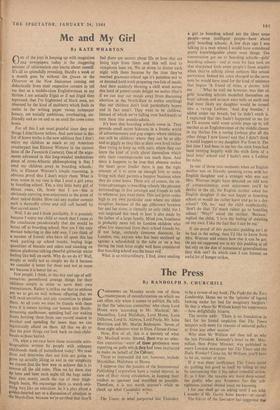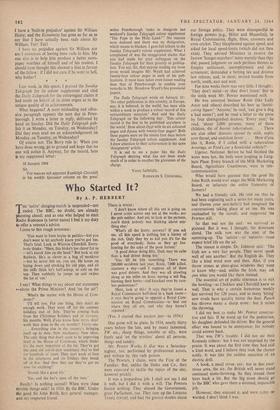The Press
By RANDOLPH S. CHURCHILL CASSANDRA on Monday wrote one of those masterpieces of misinformation on which we can often rely when it comes to politics. He tells us that the 'selection committee' who chose Lord Home were `according to Mr. Macleod,' Mr. Macmillan, Lord Hailsham, Lord Home, Lord Dilhorne, Lord St. Aldwyn, Lord Poole, Mr. John Morrison and Mr. Martin Redmayne. 'Seven of these eight selectors went to Eton. Floreat Etona.'
Now, first of all, this is a travesty of what Mr. Macleod wrote. Second, there was no selec- tion committee—some of these gentlemen were reporting on polls which they had been instructed to make on behalf of the Cabinet.
Those so instructed did not, however, include Macmillan, Hailsham or Home.
. I suppose that the pundits of the International Publishing Corporation have a vested interest, in view of their rising circulation, in keeping their readers as ignorant and mystified as possible. Therefore, it is not worth anyone's while to check, up what Cassandra writes.
* *
, The Times, in what purported last Thursday to be a review of my book, The Fight for the Tory Leadership, likens me to the 'spinster of legend looking under her bed for imaginary burglars.' So that is where Sir William keeps his suppressors —how delightfully bizarre.
The review adds: 'There is no foundation in fact for his hinted suspicion that The Times tampers with news for reasons of editorial policy or from any other motive.'
Why does Sir William not then tell us why the late President Kennedy's letter to Mr. Mac- millan, then Prime Minister, was published in every London newspaper but The Times and the Daily Worker? Come on, Sir William, you'll have to let on, sooner or later.
If it was sheer inefficiency The Times could do nothing but good to itself by telling us and by announcing that it has taken remedial action. If, as I fear, the reasons are more deep-seated, the public who pay fivepence for this self- righteous journal should insist on knowing.
I for one shall go on asking until I am told. I wonder if Mr. Gavin Astor knows--or cares'? The Editor of the Spectator has suggested that
I have a 'built-in prejudice' against Sir William Haley; and the Economist has gone so far as to say that I have actually been rude about Sir William. Tut ! Tut 1
I have no prejudice against Sir William nor am I conscious of having been rude to him. My one aim is to help him produce a better news- paper worthier of himself and of his readers. I should have thought this showed a bias in favour of the fellow: if I did not care if he went to hell, why bother? * * *
Last week, in this space, I praised the Sunday Telegraph for its colour supplement and chid the Daily Telegraph for the extravagant claims it had made on behalf of its sister organ as to the unique quality of its achievements.
What happens? A most misleading and offen- sive paragraph appears the next day in Peter- borough. I write a letter in reply, delivered by hand on Sunday. Did the Daily Telegraph pub- lish it on Monday, on Tuesday, on Wednesday? Did they even send me an acknowledgement on Monday, on Tuesday, on Wednesday?
Of course not. The Berry rule is: When you have done wrong, go to ground and hope that no one will notice it. Anyway, for the record, here is my suppressed letter: 18 January 1964 Sir,
'For reasons not apparent Randolph Churchill in his weekly Spectator column on the press' writes Peterborough 'seeks to denigrate last weekend's Sunday Telegraph colour supplement "The Pope in the Holy Land." ' No reasons were deduced and there was no denigration, which means to blacken. I gave full tribute to the Sunday Telegraph's colour supplement. What I complained of was the exaggerated claims that you had made for your colleagues on the Sunday Telegraph for their priority in publica- tion. You say, Sir, that anyone reading my loose prose would imagine Mr. Wyatt had achieved twenty-four colour pages in each of his pub- lications. It must have taken even looser reading than that of Peterborough to confine your remarks to Mr. Woodrow Wyatt's five provincial papers.
The Daily Telegraph wrote on January 10: 'No other publication in this country, in Europe, nor, it is believed, in the world, has been able within a week to produce a colour record of this extraordinary occasion.' And said the Daily Telegraph on the following day: 'This colour record is the first to be published anywhere in the world.' How about Oggi with its six coloured pages and ,Epoca with twenty-four pages? Both these papers were on the streets four days before the Sunday Telegraph colour supplement. And
drew attention to their achievement in the same 'denigratory' article.
It is sad to see a paper like the Daily Telegraph denying what has not been made much of in order to smother the gravamen of the charge.
Yours faithfully, RANDOLPH S. CHURCHILL.



































 Previous page
Previous page